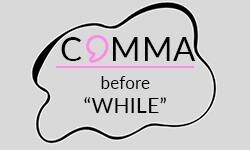
Commas are often a mystery to students, especially when it comes to academic writing. This confusion commonly arises from a lack of understanding of the detailed guidelines and special cases that dictate when commas should be used. This article sheds light on the particular rules and uses for inserting commas before the word “while” showing examples for students.
When to place a comma before “while”
The decision to use a comma before “while” depends on the function and meaning of your specific sentence. When functioning as a conjunction, it connects two independent clauses to introduce a contrasting idea. Furthermore, if it is followed by an interrupter to add emphasis or qualification, a comma will be needed as well. When it is used to indicate a period of time or duration, you typically do not need a comma before it because it acts as a preposition. Here’s a concise guide to help you decide:
Comma
Used as ”whereas” or “although”
No comma
Used as “during the time that”
Comma guidelines can differ based on various style guides, and intricate sentence structures may feature special cases regarding where to position commas. It is also worth contemplating the readability of sentences that don’t employ commas.
Comma before “while”
The word “while” is known for its various meanings. However, it always depends on which meaning you intend, whether you need a comma or not.
Used as “whereas” or “although”
“While” can be used to contrast one statement with another. It is also used to mean “whereas” or “although”. If this is what you want to say, add a comma before “while”.
You shouldn’t put a comma in front of “while” if it’s at the beginning of the sentence. In that case, you need to put it at the end of the clause that “while” introduces.
No comma before “while”
If you are talking about two things happening at the same time, no comma is needed before “while”.
Used as “during the time that”
“While” is frequently employed to convey the sense of “during the time that” or “when”. It indicates two events or things happening simultaneously.
Special case: At the beginning of a sentence
When “while” is the first word of the sentence, there shouldn’t be a comma in front of it. In this case, you need to put a comma at the end of the clause that it introduces.
Test yourself!
Practice sheet
Let’s check your understanding of using commas before “while” by placing them accurately in 10 sentences. Check your answers in the next tab.
- The children were playing at the park while I was reading my book.
- While I enjoy singing my mom prefers dancing.
- We explored historical landmarks while on vacation.
- I can work from home while my office is being renovated.
- The concert was fantastic while the movie was a bit disappointing.
- They worked diligently on the project while I handled other tasks.
- I like to swim daily while my friend prefers to swim weekly.
- He played the guitar beautifully while she sang with passion.
- They laughed and chatted while waiting for the bus.
- While some people love spicy food others can’t handle the heat.
- The children were playing at the park while I was reading my book.
- While I enjoy singing, my mom prefers dancing.
- We explored historical landmarks while on vacation.S
- I can work from home while my office is being renovated.
- The concert was fantastic, while the movie was a bit disappointing.
- They worked diligently on the project while I handled other tasks.
- I like to swim daily, while my friend prefers to swim weekly.
- He played the guitar beautifully, while she sang with passion.
- They laughed and chatted while waiting for the bus.
- While some people love spicy food, others can’t handle the heat.
Printing Your Thesis With BachelorPrint
- High-quality bindings with customizable embossing
- 3D live preview to check your work before ordering
- Free express delivery
Configure your binding now!
FAQs
When you mean “whereas” or “although”, you need to place a comma before while. By meaning “during the time that” you won’t need a comma.
Yes. There is always a comma after the end of the clause if the sentence starts with “while”.
When you mean “whereas” or “although” you need to use a comma before while.
